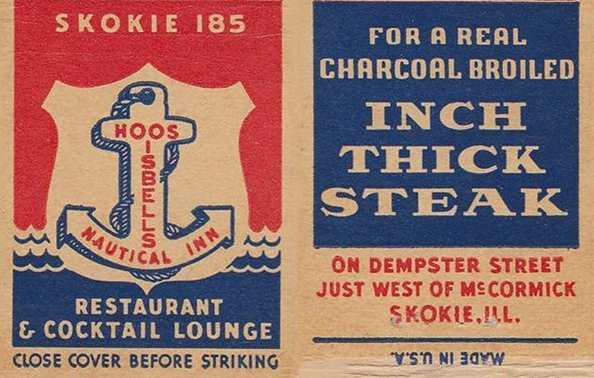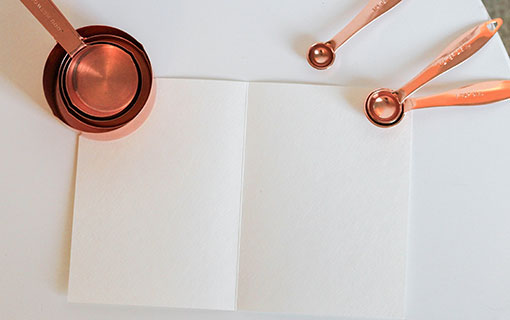In 1942 Kenneth Hoos and Leon Isbell opened Hoos-Isbell’s Nautical Inn on Dempster Street in Skokie, Illinois, a few blocks west of McCormick Boulevard. Hoos and Isbell had taken over space that had been occupied by Bob’s White Front, a neighborhood tavern, but the two men had bigger plans for their new establishment.
Hoos, the owner of Hoos Drugs in downtown Evanston, near Northwestern University, was the money man; Isbell, who’d operated the drugstore’s soda fountain and grill under a concession agreement, was the menu man and day-to-day manager. Isbell brought lots of food-service experience to the new enterprise. He also brought his wife, Nadine, whom he had met, and married, when she worked for him at the drugstore.
Isbell had already come a long way. Born on a farm in White Haven, Tennessee, south of Memphis, he was orphaned at an early age and, along with his two brothers, Marion and James, spent most of his youth in the care of orphanages or relatives. When the three Isbell boys were teenagers, and virtually penniless, they struck out for Chicago, where all three would eventually become restaurateurs.
Oddly, at the beginning the Nautical Inn’s menu wasn’t all that nautical. In 1945, for example, its advertised specialties included disjointed fried chicken (a style popularized by “Chicken in the Rough” franchisees all over the country), roast prime rib of beef, chicken livers with wild rice, and barbecue spareribs. For diners who couldn’t or didn’t want to drive to the restaurant, the Nautical Inn offered shuttle service, via station wagon, every hour from 6 p.m. till midnight from the Davis Street “L” station in Evanston.
Around this time Isbell was able to buy out his partner, and “Hoos-Isbell’s Nautical Inn” became “Leon Isbell’s Nautical Inn.” In 1947 he was the first of 13 restaurant and tavern owners in Skokie who refused to testify in a police corruption trial involving slot machines. “I refuse to testify,” he said, after giving his name and address, “because I don’t know anything, and anything I said might be used against me.” (All of those who followed Isbell to the witness chair invoked similar language, except for Albert Bose of the Silver Tray tavern, who refused to testify because, he said, “I might intimidate myself.”
These were years when restaurants in Skokie banded together to run ads in the big Chicago newspapers that urged city dwellers readers to “Dine in the Country.” As one such ad put it, “You’ll often find that a drive out to Skokie is faster, and far more enjoyable, than looking for a parking space in the city.” And by now the star attraction on the menu of the Nautical Inn’s Anchor Room was a “fisherman’s platter” with “lobster tail, filet of perch, and French fried shrimp.”
The Nautical Inn thrived through the 1950s, with Leon and Nadine, along with their son, George, keeping things running smoothly. But in January 1962 Leon Isbell died at age 54 after suffering a heart attack as he shoveled snow from the sidewalks in front of the restaurant, and Nadine decided against continuing in the business. (She would die in 2001 at age 88.) An elegant new restaurant, La Maisonette, soon opened in the same space but didn’t last very long. By 1991, in fact, a writer for the Chicago Tribune observed that the 3400 block of Dempster Street in Skokie “seemed to be a magnet for failure for a quarter century.”
Here’s the recipe for the Nautical Inn’s Princess Potatoes, as they were prepared in the early 1950s.

Princess Potatoes
These Princess Potatoes were one of the most popular side dishes at Leon Isbell's Nautical Inn in Skokie, Illinois. Here's how the restaurant's chef, Arthur Jackson, prepared them in the early 1950s. (His institutional-size recipe has been scaled down for home use.)
Ingredients
- 8 cups peeled and diced potatoes (about 7 medium russet potatoes)
- Vegetable or peanut oil, for frying
- 3/4 cups julienned ham
- 1 julienned pimiento (cherry) pepper
- 1 1/2 cups julienned green bell peppers
- 1 cup beef stock
Instructions
Heat oven to 350 degrees.
Deep-fry the potatoes. Drain on paper towels.
Put the potatoes in a 3-quart baking dish. Blend in the ham and peppers and evenly drizzle the stock over the vegetable.
Bake, covered, 20 minutes.
Notes
Jackson also suggested using curly- or waffle-cut potatoes with this recipe.










No Comments